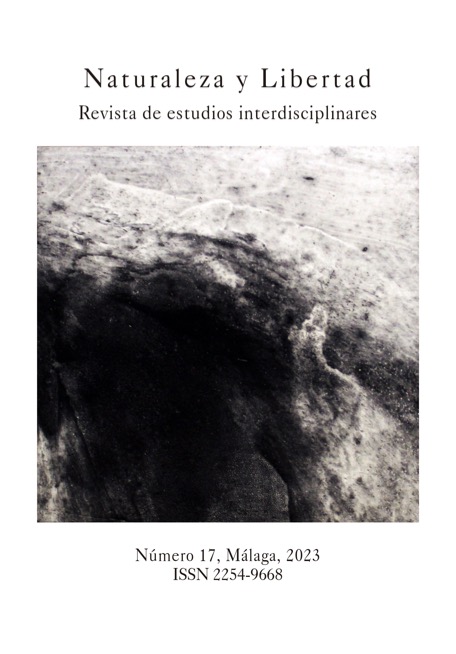The homo risv capaz theory (laughter as an exclusive human capacity) in Isidore of Seville.
Background, delimitation and isidorian contributions.
DOI:
https://doi.org/10.24310/nyl.17.2023.16406Keywords:
Isidore of Seville, Laughter, Anthropophilosophy, Homo risv capaxAbstract
In the twenty-fifth chapter of the second book of Etymologies, epitome of the Isagoge of Profirius, the Sevillian philosopher Isidore of Seville, taking the example of the Syrian thinker, takes up the anthropo-philosophical theory of homo risv capax, that is, the human being defined as the only living being, mortal or immortal, irrational or rational, capable of laughing. Or, in others words, laughter understood as what is (most) proper -in the sense of exclusive- to the human being. A theory that has a long trajectory in the history of ancient Western philosophy up to the approach of the philosopher from Seville (and also after him). This article presents the Isidorean proposal by showing the background, both general and specific, to the question of laughter as a singular and distinctive human property, as well as a delimitation of the sense exposed in the thought and work of Isidore of Seville, together with the existing differences between those of the Sevillian thinker and his philosophical precedents, that is, his specific contributions.
Downloads
Metrics
References
Aristóteles (2000): Partes de los animales. Gredos: Madrid.
Aristóteles (2000): Tópicos. Órganon. Gredos: Madrid.
Aristóteles (2004): Problemas. Gredos: Madrid.
Agustín de Hipona (1963a): «Contra los académicos», en Obras de San Agustín, v. III. B.A.C.: Madrid.
Agustín de Hipona (1963b); Del libre albedrío. Obras de San Agustín, v. III. B.A.C.: Madrid.
Cicerón, M.T., (2002): Sobre el orador. Gredos: Madrid.
Clemente de Alejandría (1998): El pedagogo. Gredos: Madrid.
Diógenes Laercio (2007). Vida y obras de los filósofos ilustres. Alianza: Madrid.
Eggers, C. et Juliá, V., (1986). Los filósofos presocráticos, v. III. Gredos: Madrid.
Filón de Alejandría (2010a). «Las insidias de lo peor contra lo mejor», en Obras completas, II. Trotta: Madrid.
Filón de Alejandría (2010b): «Sobre la plantación», en Obras completas, v. II. Trotta: Madrid.
Filón de Alejandría (2012): «La migración de Abraham», en Obras completas, v. III. Trotta: Madrid.
Filón de Alejandría (2016): «Premios y castigos», en Obras completas, v. IV. Trotta: Madrid.
Isidoro de Sevilla (1971): Reglas monásticas de la España visigoda. B.A.C.: Madrid.
Isidoro de Sevilla (1992): Diferencias, v. I. Les belles lettres: París.
Isidoro de Sevilla (2004): Etimologías. B.A.C.: Madrid
Isidoro de Sevilla (2006): Liber differentiarum, v. II. Brepols: Turnhout.
—— (2009): Sentencias. B.A.C.: Madrid.
Jámblico (2003): Protréptico. Gredos: Madrid.
Leandro de Cartagena (1979): De la instrucción de las vírgenes y desprecio del mundo. Fundación Universitaria Española: Madrid.
Porfirio (2003): Isagoge. Anthropos: Barcelona.
Séneca, L. A., (1986a): Epístolas morales a Lucilio, v. I. Gredos: Madrid.
Séneca, L. A., (1986b): Epístolas morales a Lucilio, v. II. Gredos: Madrid.
Séneca, L. A., (2013a): «Sobre la ira», en Consolaciones. Diálogos. Apocolocintosis. Epístolas Morales a Lucilio. Gredos: Madrid.
Séneca, L. A., (2013b): «Sobre la tranquilidad del espíritu», en Consolaciones. Diálogos. Apocolocintosis. Epístolas Morales a Lucilio. Gredos: Madrid.
Suárez, F., (1991): Comentario a los libros de Aristóteles sobre el alma. Fundación Xavier Zubiri: Madrid.
Tomás de Aquino (1994): Suma de Teología, IV. BAC: Madrid.
Downloads
Published
How to Cite
Issue
Section
License
Copyright (c) 2023 Nature & Freedom. Journal of Interdisciplinary Studies.

This work is licensed under a Creative Commons Attribution-NonCommercial-ShareAlike 4.0 International License.
Those authors who have publications with this journal, accept the following terms:
1. Copyright and licensing information are clearly described on the journal’s web site: all content published in Naturaleza y Libertad is open acces without limit, and are subject to the Attribution-NonCommercial-ShareAlike 4.0 International (CC BY-NC-SA 4.0) license. The full text of which can be consulted at https://creativecommons.org/licenses/by-nc-sa/4.0/
2. It is the responsibility of the authors to obtain the necessary permissions for the images that are subject to copyright. The authors whose contributions are accepted for publication in this journal will retain the non-exclusive right to use their contributions for academic, research and educational purposes, including self-archiving or deposit in open access repositories of any kind. The electronic edition of this magazine is edited by the Editorial de la University of Malaga (UmaEditorial), being necessary to cite the origin in any partial or total reproduction.
3. This journal allows and encourages authors to publish papers on their personal websites or in institutional repositories, both before and after their publication in this journal, as long as they provide bibliographic information that accredits, if applicable, your posting on it.
4. In no case will anonymous papers be published.





18.png)













